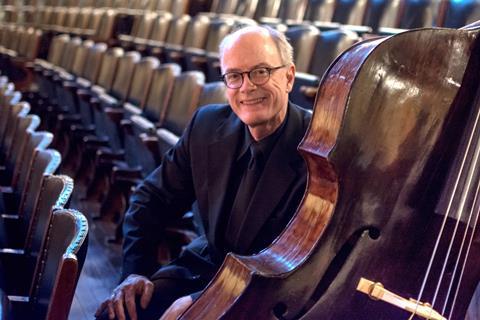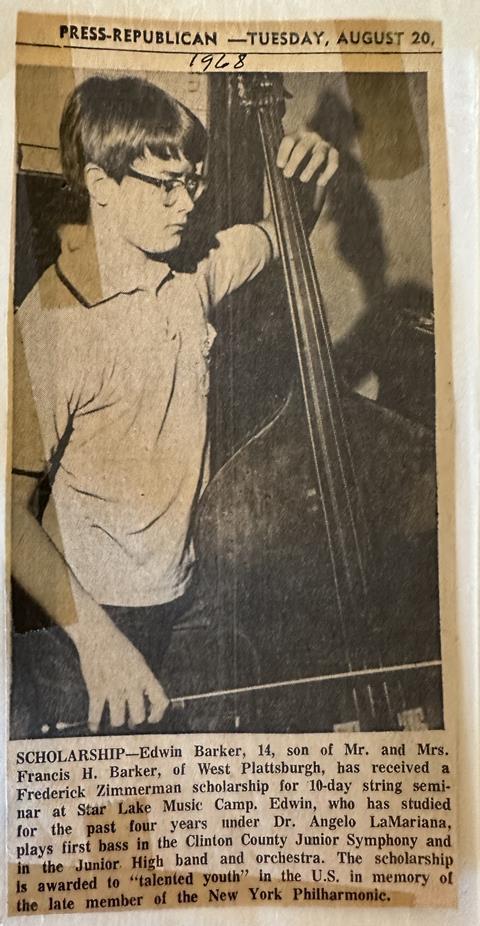The US principal bassist on his love for orchestral playing and approach to leading

Discover more Featured Stories like this in The Strad Playing Hub.
Read more premium content for subscribers here
I still remember one of my early teachers, Angelo LaMariana, telling our music class: ‘Are you a quitter, or are you going to push through and work to your ability?’ That was when I really decided to stick with bass playing. He was a no-nonsense disciplinarian, much like Henry Portnoi, one of my great influences later on. He was then principal bass of the Boston Symphony and I studied with him at the New England Conservatory. I always remember the silence after the first time I played for him, after which he said: ‘Well… you should be very successful,’ before ripping me to shreds! He was teaching at a very high level.
Another of my great mentors, Peter Mercurio, was quite the opposite. He was definitely demanding, but also had an easy-going personality. I took lessons with him at UCLA when I was about 14, and he was my role model. It was during that time in Los Angeles that I first played the major symphonic works with the UCLA Symphony while I was still in middle school. I just absolutely loved the string sound, and it lit a fire in my belly.
My goal was always to play in an orchestra because the bulk of the great double bass classical repertoire is orchestral. From the age of 15 I played professionally in various orchestras, from the Vermont and Albany Orchestras, eventually reaching the New York Philharmonic and Chicago Symphony. I observed the section leaders closely, which came in handy when at 22 I became principal bass of the Boston Symphony. It was certainly a baptism of fire – on my first day I had to play the solo in Mahler’s First Symphony and then record it a week later!

My approach to leading hasn’t really changed to this day. It isn’t your place as a leader to tell the very accomplished professionals in your section how to play. Your role is to lead by example, which means always playing well. It’s human nature that there will always be individuals who may not like you, but you can’t take it personally. You need to have a sense of humour and develop a respect in the section that goes both ways.
Young musicians must remember how much work it takes to be a professional. You’re asking someone to part with their hard-earned money and pay you for your services, so you need to have complete control over your craft. And learning your craft means learning how to make music – and to make music consistently.
You must have as much respect for orchestral playing as you do for solo playing, even though there may be differences in their technical requirements. Orchestral playing is chamber music – you’re watching, listening, reacting, and you must have the skills to be able to do it. When push comes to shove and you want a stable career, you’ll likely need a job in an orchestra. And to do that, you need a very good handle on how to play that repertoire.
INTERVIEW BY RITA FERNANDES
Read: Opinion: Does an orchestra’s home hall define its sound?
Read: Technique: Phrasing musically under pressure
Discover more Featured Stories like this in The Strad Playing Hub.
Read more premium content for subscribers here
The number one source for playing and teaching books, guides, CDs, calendars and back issues of the magazine.
In The Best of Technique you’ll discover the top playing tips of the world’s leading string players and teachers. It’s packed full of exercises for students, plus examples from the standard repertoire to show you how to integrate the technique into your playing.
The Strad’s Masterclass series brings together the finest string players with some of the greatest string works ever written. Always one of our most popular sections, Masterclass has been an invaluable aid to aspiring soloists, chamber musicians and string teachers since the 1990s.
The Canada Council of the Arts’ Musical Instrument Bank is 40 years old in 2025. This year’s calendar celebrates some its treasures, including four instruments by Antonio Stradivari and priceless works by Montagnana, Gagliano, Pressenda and David Tecchler.






































No comments yet